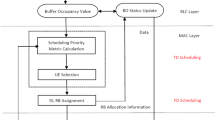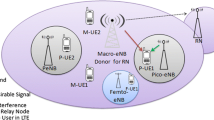Abstract
Long Term Evolution (LTE) is the wireless broadband technology developed by Third Generation Partnership Project (3GPP) to support higher data rate. Resource scheduling in LTE plays an important role in deciding the overall network performance. In this paper, a new scheduling approach called Service Based Scheduler (SBS) is proposed that is suitable for real time services. In this method, two tag values called maximum tag value (T max ) and minimum tag value (T min ) are estimated for the packets based on the type of bearers. T max is calculated for Guaranteed Bit Rate (GBR) bearers and T min is calculated for non GBR bearers. Then, separate ascending sorted lists are formed for T max and T min . The packets from the T max list are allocated first in spite of users’ channel condition. After the allocation of packets from T max list, if the current Transmit Time Interval (TTI) has more resources, then packets from T min list are allocated strictly based on users’ channel conditions. The proposed scheduling approach provides better performance for real time services compared to other schemes like Proportional Fairness (PF), Modified Largest Weighted Delay First (MLWDF), Exponential rule (EXP rule) and Logarithmic rule (LOG rule).






Similar content being viewed by others
References
3GPP, Technical Specification Group Radio Access Network—Requirements for Evolved UTRA (E-UTRA) and Evolved UTRAN (E-UTRAN), 3GPP TS 25.913.
Dahlman, E., Parkvall, S., Skold, J., & Beming, P. (2008). 3G Evolution HSPA and LTE for mobile Broadband. Waltham: Academic Press.
3GPP, Technical Specification Group Radio Access Network—Physical Channel and Modulation (Release 8), 3GPP TS 36.211.
Zyren, J. (2007). Overview of 3GPP Long Term Evolution physical layer. Austin: Freescale semiconductor.
3GPP, Technical Specification Group Radio Access Network—Physical Layer Procedures (Release 8), 3GPP TS 36.213.
Kolehmainen, N., Puttonen, J., Kela, P., Ristaniemi, T., Henttonen, T., & Moisio, M. (2008). Channel quality indication reporting schemes for UTRAN long term evolution Downlink. In Proceedings of IEEE Vehicular Technology Conference (pp. 2522–2526), Marina Bay, Singapore: VTC-Spring.
3GPP, Tech. Specific. Group Services and System Aspects—Policy and charging control architecture (Release 9), 3GPP TS 23.203.
Capozzi, F., Piro, G., Grieco, L. A., Boggia, G., & Camarda, P. (2013). Downlink packet scheduling in LTE cellular networks: Key design issues and a survey. IEEE Communications Surveys and Tutorials, 15(2), 678–700.
Liu, X., Chong, E. K. P., & Shroff, N. B. (2003). A framework for opportunistic scheduling in wireless networks. Computer Networks, 41(4), 451–474.
Sadiq, B., Baek, S. J., & de Veciana, G. (2011). Delay-optimal opportunistic scheduling and approximations: The Log rule. IEEE Transactions on Networking, 19(2), 406–418.
Pokhariyal, A., Monghal, G., Pedersen, K. I., Mogensen, P. E., Kovacs, I. Z., Rosa, C., et al. (2007). Frequency domain packet scheduling under fractional load for the UTRAN LTE Downlink. In IEEE 65th Vehicular Technology Conference, pp. 699–703.
Holtzman, J. M. (2001). Asymptotic analysis of proportional fair algorithm. In Proceedings of the 12th IEEE international symposium on personal, indoor and mobile radio communications, San Diego, California, USA, 2, F33–F37.
Kushner, H. J., & Whiting, P. A. (2004). Convergence of proportional-fair sharing algorithms under general conditions. IEEE Transactions on Wireless Communications, 3(4), 1250–1259.
Fraimis, I. G., & Kotsopoulos, S. A. (2013). Queue-aware resource allocation for multi-cell OFDMA systems with qos provisioning. Wireless Personal Communication, 71, 3033–3044.
Song, Jungsup, Gil, Gye-Tae, & Kim, Dong-Hoi. (2010). Packet-scheduling algorithm by the ratio of transmit power to the transmission bits in 3GPP LTE Downlink. Eurasip Journal on Wireless Communications and Networking, 2010, 1–8.
Wong, I. C., Shen, Z., Evans, B. L., & Andrews, J. G. (2004). A low complexity algorithm for proportional resource allocation in OFDMA systems. IEEE Workshop on Signal Processing Systems, USA, 1, 1–6.
Kwan, R., Leung, C., & Zhang, J. (2009). Proportional fair multiuser scheduling in LTE. IEEE Signal Processing Letters, 16(6), 461–464.
Ramli, H., Basukala, R., Sandrasegaran, K., & Patachaianand, R. (2009). Performance of well known packet scheduling algorithms in the downlink 3GPP LTE system. Proceedings of IEEE Malaysia International Conference on Communication, MICC, Kuala Lumpur, Malaysia, 1, 815–820.
Iturralde, M., Yahiya, T., Wei, A., & Beylot, A. L. (2011). Performance study of multimedia services using virtual token mechanism for resource allocation in LTE networks. IEEE Vehicular Technology Conference, 1, 1–5.
Sadiq, B., Madan, R., & Sampath, A. (2009). Downlink scheduling for multiclass traffic in LTE. Eurasip Journal on Wireless Communications and Networking, 2009, 1–18.
Brehm, M., & Prakash, R. (2013). Overload-state Downlink resource allocation in LTE MAC layer. Wireless Networks, 19, 913–931.
Lai, W. K., & Tang, C.-L. (2013). QoS-aware Downlink packet scheduling for LTE networks. Computer Networks, 57, 1689–1698.
Jiang, D., Wang, H., Malkamaki, E., & Tuomaala, E. (2007). Principle and performance of semi-persistent scheduling for VoIP in LTE system. In Proceedings of the international conference on wireless communications, networking and mobile computing, pp 2861–2864.
Choi, S., Jun, K., Shin, Y., Kang, S., & Choi, B. (2007). MAC scheduling scheme for VoIP traffic service in 3G LTE. In Proceedings of the 66th IEEE vehicular technology conference, Baltimore, Md, USA, pp. 1441–1445.
Wang, H., & Jiang, D. (2008). Performance comparison of control-less scheduling policies for VoIP in LTE UL. In Proceedings of the IEEE Wireless Communications and Networking Conference, Las Vegas, NV, USA, pp. 2497–2501.
Bokhari, F. A., Yanikomeroglu, H., Wong, W. K., & Rahman, M. (2009). Cross-layer resource scheduling for video traffic in the Downlink of OFDMA-based wireless 4G networks. Eurasip Journal on Wireless Communications and Networking, 2009, 1–10.
Keshav, S. (1997). An engineering approach to computer networking: ATM networks, the Internet and the Telephone Network. Boston: Addison-Wesley.
Lin, Y. B., & Pang, A. C. (2005). Wireless and Mobile All-IP Networks. Colorada: Wiley.
Cormen, T. H., Leiserson, C. E., Rivest, R. L., & Stein, C. (2009). Introduction to Algorithms. Cambridge: MIT press.
Piro, G. LTE-Sim—the LTE simulator. http://telematics.poliba.it/LTE-Sim
Piro, G., Grieco, L. A., Boggia, G., Capozzi, F., & Camarda, P. (2010). Simulating LTE cellular systems: An open source framework. IEEE Transactions on Vehicular Technology, 60(2), 498–513.
Jain, R. K., Chiu, D. M. W., & Hawe, W. R. (1984). A quantitative measure of fairness and discrimination for resource allocation in shared computer system. Digital Equipment Corporation Report, DEC-TR-301.
Author information
Authors and Affiliations
Corresponding author
Rights and permissions
About this article
Cite this article
Fouziya Sulthana, S., Nakkeeran, R. Performance Analysis of Service Based Scheduler in LTE OFDMA System. Wireless Pers Commun 83, 841–854 (2015). https://doi.org/10.1007/s11277-015-2429-8
Published:
Issue Date:
DOI: https://doi.org/10.1007/s11277-015-2429-8




